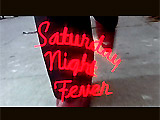
|
Saturday Night Fever (1977)
In director John Badham's melodramatic, out-dated,
coming-of-age disco dance classic, a defining 70s dance film that
was the biggest musical sensation and blockbuster of the late 1970's
(from co-producer Robert Stigwood); it was adapted by screenwriter
Norman Wexler from Nik Cohn's New York Magazine story "Tribal
Rites of the New Saturday Night"; the musical drama-dance film
featured one of the most famous and successful song soundtracks in
film history, and was responsible for the Disco Craze phenomenon,
launching hot disco clubs (like Studio 54) and the film super-stardom
of then 23-year old John Travolta, previously best known as one of
the Sweathogs of the television sitcom Welcome Back, Kotter:
- in the memorable opening scene, under the credits, a
conflicted, 19 year-old, teenaged, self-centered, working-class
Italian-American anti-hero from Brooklyn, swaggering Anthony "Tony"
Manero (a star-making role for John Travolta with the film's sole
Oscar nomination) strutted down the sidewalk (with a close-up of his footsteps) to the lyrics
of the Bee Gees' "Stayin' Alive": "Oh,
you can tell by the way I walk / I'm a woman's man, no time to
talk"; he worked in a lowly, dead-end job as a clerk in the paint department of a local
hardware store, and thus was swinging a paint can
- the not-very-bright Tony lived at home with his
oppressive, suffocating, and verbally-abusive blue-collar family,
including his alcoholic father Frank, Sr. (Val Bisoglio) and overbearing
mother Flo (Julie Bovasso), his foreign-language speaking Grandmother
(Nina Hansen), and his younger sister Linda (Lisa Peluso); he was
often downgraded as the 'black sheep' of the family in comparison
to his older brother - Roman Catholic priest Frank, Jr (Martin
Shakar)
- after dark (and especially
on Friday and Saturday nights), however, Tony became the dynamic,
undisputed disco-dancing king and legend of a local nightclub
(the 2001 Odyssey); since it was a Friday night after work, in
front of a mirror, Tony primped and preened before leaving for
the disco
- with his gang of loutish, uneducated
and unambitious friends, including Joey (Joseph Call), Double J.
(Paul Pape), and young Bobby C. (Barry Miller),
Tony entered the disco dance hall personifying royalty, and oozing
macho sexual virility and arrogance; Manero sought escape
from his desperate plight of a boring and staid home life and low-life
friends by finding recognition on the dance floor
- Tony noted that he regarded dancing as a sacramental
discipline that he had perfected into an art form, rather than
as a mating ritual: "You make it with some of these chicks, they
think you gotta dance with 'em" - a reversal of the normal sexual
dynamic between males and females
- one of the regulars at the 2001 club was slightly
chubby Annette (Donna Pescow), Tony's most adoring, on again/off-again,
admiring girlfriend who wanted the two of them to partner up for
the Odyssey's dance competition; Tony's troubled
character, with flashes of racism, immaturity, obnoxiousness, and
misogyny, was evident in his frequent sexual abuse and disregard
for Annette; he rejected her many offers when she wanted
to have sex with him
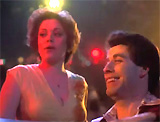
|
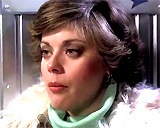
|
|
Tony's Ardent But Rejected Admirer Annette (Donna Pescow)
|
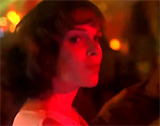
|
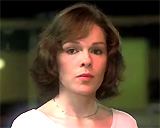
|
|
Tony's First Views of White-Dressed
Dancer Stephanie (Karen Lynn Gorney): At the Night Club and at the Dance Studio
|
- Tony's upward-striving class aspirations were reflected
in his choice of dance partners; Tony caught
a glimpse of another very skilled and talented dancer in a white
dress, Stephanie Mangano (Karen Lynn Gorney), and quickly became
impressed by her
- one of the film's dance
highlights was Tony's line dancing to the tune of the Bee Gees'
"Night Fever" while a fog machine filled the dance floor with smoke
- and then on another weekend, Tony brilliantly solo-danced to
the Bee Gees' tune: "You Should Be Dancing" when the appreciative
crowd cleared the floor to watch him perform by himself; it was
a spectacular number, with the studly Tony (decked out in a
wide-collared shirt with platform shoes and flared
pants) gyrating and hip-swiveling on a pulsating color-tiled dance
floor of the 2001 Odyssey club under a twinkling disco ball
- when Tony was able to have a substantial conversation
with Stephanie in the Phillips' Dance Studio and at a restaurant,
he learned that she was working her way up in a show business agency
in Manhattan, and was more independent-minded, cool-headed and
intelligent than all of his previous female friends; she wanted
to keep him at arm's length and only remain professional ("nothing
personal...I don't wantcha comin' on to me"). She didn't want to
socially fraternize with Tony (because of their cultural and emotional
differences, his young age, his class-lessness, his lack of direction
in life, and his social immaturity). She bluntly told him: "You're
a cliche. You're nowhere on your way to no place" - but then she
accepted his offer to partner with him for the club's city-wide
dance contest, although he had already promised Annette to pair
up with him and had practiced with her; he admitted that beyond
the club and dancing, now that he was getting older, he also had
aspirations to get a "high" elsewhere: "Dancin' - it can't last
forever, it's a short-lived kinda thing"
- late one evening, Tony's gang and Annette drove
to the Verrazzano-Narrows Bridge (a symbol of the link to a better
life between the Bay Ridge area of Brooklyn and the more
suburban, upscale area of Staten Island), where some of them climbed
up the support cables and pretended to fall in daredevil stunts to
frighten Annette - a foreshadowing of a future tragic disaster
- after Tony was fired (only temporarily) from his
job for requesting an afternoon off, he
assisted Stephanie when she was moving into a new NYC townhouse;
there, she happened to encounter her older benefactor -
record producer Jay Langhart (Donald Gantry), with whom she had
been having an affair; he had supportively
helped to boost her career, but had moved on and dropped her; Tony
expressed his jealousy toward Stephanie's choice of the older man
in order to get ahead
- the climactic musical highlight was the club's dance
competition, with teams from around the city competing for the
$500 prize; during Tony (wearing a white-suit and black shirt)
and Stephanie's performance (to the tune of "More Than a Woman"),
they paused mid-dance for a spontaneous lengthy kiss,
thereby throwing off their routine's timing; Tony appeared dejected
and feared they had lost the competition, but because they were
on their home turf, the fans cheered them on and they were awarded
first prize
- following the awards, Tony astounded everyone by
complaining about the "rigged" outcome, expressing how
he believed the judges' decision was racially-motivated, and that
he didn't deserve to win; he felt that a Puerto Rican couple who
performed the Mambo (and placed second) were better dancers, and
handed over his trophy and award money to them
- then as he departed with Stephanie, the incensed Tony ordered
her into the back seat of a car, called her a "cock-tease," and attempted
- unsuccessfully - to rape her, but she prevented him by kicking
him in the groin before running off
- later that evening, Tony joined his intoxicated
buddies with Annette, who was double-raped by Joey and then Double
J. in the back seat of their car as they drove to
visit the Verrazzano-Narrows bridge; Bobby
C. had become very depressed and desperate after impregnating his
devout Catholic girlfriend Pauline, and was faced with eveyone
pressuring him to get married; to prove himself, he carelessly
and recklessly performed dare-devil stunts on the bridge cables
and beams, slipped, and fell to his death (it was either an accident
or suicide?); he plummeted into the water many hundreds of feet
below, presumably breaking his neck or skull with the impact
|
Bobby's Accidental and Fatal Fall
|
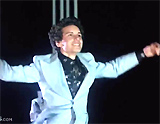
|
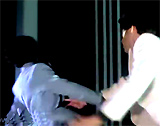
|
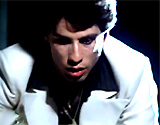
|
- Bobby C.'s death proved to be a significant crossroads
in Tony's coming-of-age - he spent the entire remainder of the
night (riding on the subway and ending up in Manhattan) while he
contemplated leaving his old life (of fleeting dancing
prowess on Saturday nights with his moronic "asshole" friends)
and choosing a new life and future of work in the city with Stephanie
- early the following morning, Tony visited Stephanie
in her new apartment to apologize for his behavior, and she also
apologized for her treatment of him; he attempted
to reestablish a new relationship with her as "friends," and although
he wanted a romantic-sexual relationship with her, she reinterated
to him that she still wanted to be friends only; she admitted that
she admired him and accepted his plan to leave Brooklyn and relocate
in Manhattan to begin a new life
|
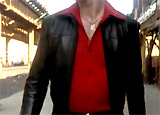
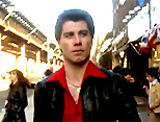
Opening Credits Sequence
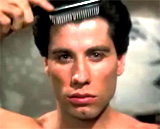
Tony Manero (John Travolta) Preening and Priming Before Mirror Before
Night at the Disco
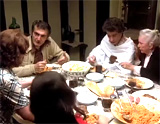
Tony's Italian-American Family at Dinner
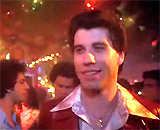
Tony Entering Disco Club, 2001 Odyssey
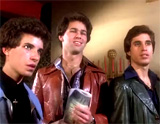
Tony's Gang of Buddies: (l to r): Bobby C., Double J., and Joey
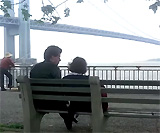
With Stephanie at the Verrazzano-Narrows Bridge
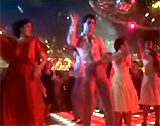
Tony's Line Dancing: "Night Fever"
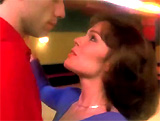
Dance Practice with Stephanie at Studio
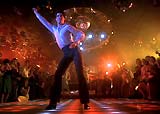
Tony's Solo Dancing at the Club: "You Should Be Dancing"
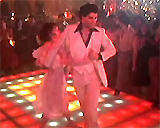
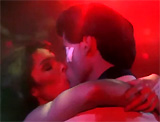
Club's Dance Contest: with Stephanie (with Kiss)
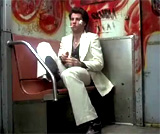
After Bobby's Death, Tony's All-Night Subway Ride
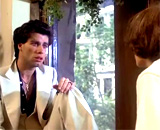
Ending Conversation with Stephanie
|















